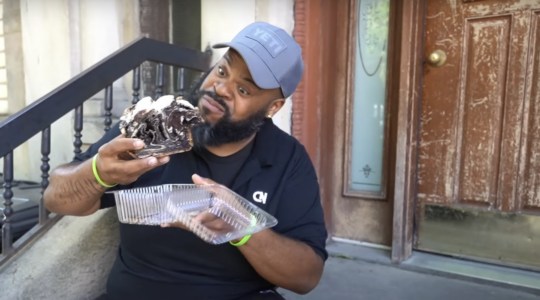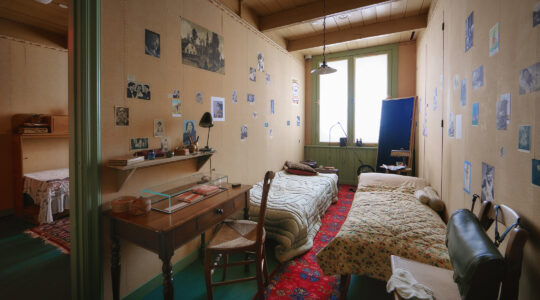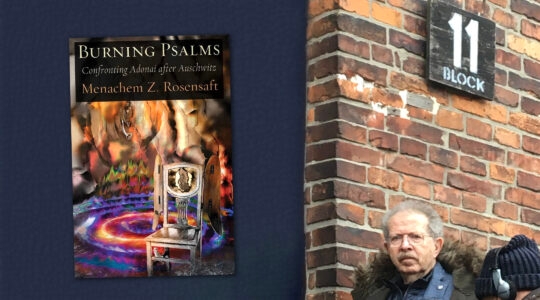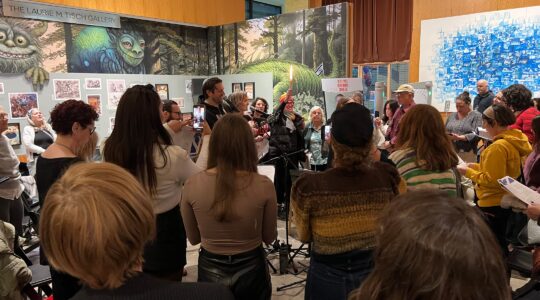Kim Moskowitz has spent nearly two decades navigating the world of special-needs schools and services for her middle child, Rachel, a 19-year-old with a speech and language disability.
A Modern Orthodox Jew living on the Upper East Side, she has encountered her share of frustration, especially as she looked for a Jewish day school or yeshiva with the resources that might have served her daughter, only to conclude that none did. Like the parents of many Jewish children with disabilities, Moskowitz decided reluctantly that she’d have to send her daughter to a public school, outside the orbit of Jewish education.
But the 52-year-old mother has also experienced joy as her daughter overcame some of her challenges, prepared for her bat mitzvah and, more recently, headed to Israel, where she currently attends a yeshiva, said Moskowitz, who requested anonymity for both herself and Rachel to safeguard her daughter’s interests. And Moskowitz — not her real name — hopes for more nachas as Rachel finds a job and meets a partner.
“She’s going to make someone a great wife,” said Moskowitz, who at times sounds like a cheerleader for her daughter. “She’s going to make a great mother,” too, she added, describing Rachel as warm, joyful, kind and, defying all expectations, an avid reader.
Those hopes are what brought Moskowitz to a recent conference of Yad HaChazakah-The Jewish Disability Empowerment Center, a 4-year-old group that advocates for Jews with disabilities. Held in Borough Park on a cold day in mid-December, the conference drew more than 200 people, most of them Modern Orthodox and fervently Orthodox Jews with disabilities and members of their families.
All those attending the conference shared one common goal, said Sharon Shapiro-Lacks, Yad HaChazakah’s founder and executive director: a commitment to expanding the horizons for Jews with disabilities who have ended their formal education and are preparing for their next step in life. Toward that end, workshops at the event explored the job world and preparations for marriage, what some participants called the “final frontier” for special-needs Jews.
The conference also emphasized the idea that Jews with disabilities should not only be made full participants in Jewish life, but also appointed to leadership positions in the Jewish community, especially in those organizations and committees that plan services for the disabled.
The Jewish community remains “very chesed-oriented,” said Shapiro-Lacks, using the Hebrew term for “loving-kindness” or, more loosely, charity — an approach that she and others believe looks as people with disabilities as needy, with nothing of their own to contribute.
But that view is a false one, said Shapiro-Lacks, who is confined to a motorized wheelchair because of cerebral palsy. The more accurate picture is that Jews with disabilities are “an untapped resource” whose “unique perspective” can only strengthen the Jewish community.
“People with disabilities often have to be very creative at problem-solving,” Shapiro-Lacks said. “They’ve learned to anticipate challenges” and can teach the community the skills to do likewise.
That message appears to be resonating more and more broadly within the Jewish community, say Jewish leaders and professionals with knowledge of the Jewish disability field. Although everyone who spoke to The Jewish Week believes the community still has a long way to go, some said they believe that attitudes and sensitivities within the community may have reached a critical mass — a “tipping point,” in Moskowitz’s words.
The idea that programs and organizations are now pushing for job and marriage opportunities “shows how far we’ve come,” said Howard Blas, an educator who directs the special-needs program for Camp Ramah in New England and helps prepare special-needs children for their bar and bat mitzvahs.
“I think families are not going to take no for an answer any more,” Blas said, referring to the relatives of Jews with disabilities. “They’re really trying to affect change.”
Yad HaChazakah and its leaders, including Shapiro-Lacks and her husband, Yisroel Lacks, is seen by at least some in the community as a harbinger of that change. Although the organization is small, serving about 300 people annually, it claims to be the only Jewish disability organization led primarily by Jews with disabilities or ongoing health conditions.
The organization is an alumnae of Bikkurim: An Incubator for New Jewish Ideas, a joint project of the Jewish Federations of North America and Kaminer Family, which continues to give Yad HaChazakah office space and provide consulting, training and financial support.
But evidence that others in the Jewish community are now paying attention to the same issues can be seen in a variety of endeavors. Consider the following:
n Several Jewish organizations now have programs aimed at preparing Jews with disabilities for the possibility of marriage and finding those who are ready for marriage the right partner. The programs include Ohel’s Simcha Program, which recently opened its doors to Jews outside the agency’s residential clients, and ChaiLifeline’s SOS Tassis, aimed at people in the Orthodox community’s shidduch, or matchmaking, system.
n Ohel has begun a formal campaign of fighting the stigma associated with mental illness and other disabilities — part of an ongoing effort tied closely to the agency’s mission, Ohel executives said.
n More broadly, the Yad HaChazakah conference is one of a string of recent events that have focused on special needs in the Jewish community. One such event, organized by the Ruderman Family Foundation, the Jewish Funders Network, the Jewish Federations of North America and Boston’s Combined Jewish Philanthropies, brought together an international group of funders for the first time to look at best practices in the field and how special-needs Jews could become full participants in Jewish life.
Jay Ruderman, president of the Ruderman Family Foundation, said from his home in Rehovot, Israel, that he agrees with those who say that a tipping point may be approaching.
“There is a kind of critical mass or consensus that’s emerging across the agency spectrum,” he said. While independent, stand-alone programs have existed in many places, he added, no communitywide conversation has taken place about “how to include special-needs people in Jewish communal life.” But that conversation, he believes, is now beginning.
UJA-Jewish Federation of New York has done much work in the field, funding services, organizing conferences and working with synagogues on inclusion efforts, said Roberta Leiner, managing director of Federation’s Caring Commission. “Inclusion,” one of the most often-used terms when it comes to Jews with disabilities, means providing services and structures, such as ramps, that would allow them to participate in Jewish life more fully.
In addition to organizing a Shabbat of Inclusion two years ago, an educational event that took place at synagogues throughout the region, Federation has organized training sessions for synagogue clergy, lay leaders and staff to help them launch inclusion committees. The Caring Commission has also focused on autism in the past five years, funding services for families affected by the condition and planning a symposium on the subject for this May.
While praising those efforts, Shapiro-Lacks, a member of federation’s Task Force on Disabilities, said the Jewish community, in general, needs to do more — a view shared by others, including Leiner. The challenges can involve an issue as basic as language, as Shapiro-Lacks made clear during an interview.
“When you talk about inclusion, it says to me, ‘Please include me,’” she said. “We’re not asking to be included; we want to participate and lead.”
Responding to that sentiment, UJA-Federation’s Anita Altman, deputy managing director of government and external relations, said federation leaders and Yad HaChazakah “are on the same page.” Shapiro-Lacks, she said, is playing a crucial role in the community, acting as a guiding light, while Federation is trying to move at a quicker pace. “But change takes time.”
Meanwhile, Yad HaChazakah is bringing a new group of activists to the fore.
They include Shapiro-Lacks, a former activist in the secular disability-rights movement, who created the organization to speak the language of the Orthodox community. While the secular community speaks about “civil rights” for people with disabilities, she said, much of the Orthodox community might talk about “dignity and obligations — what’s good to do and what’s not correct to do.”
They also include Michael Levy, vice president of Yad HaChazakah, who, like others in the organization, speaks about empowerment. Blind from birth, the 58-year-old Levy said the problem facing many disabled people isn’t discrimination per se, but a poor self-image.
“If you asked me why I have a job today, I’d say it’s because my parents didn’t treat me like a special-needs person,” said Levy, an employee of the Metropolitan Transportation Authority whose job involves helping people with disabilities learn how to use public transit.
And they include Moshe Sokol, 22, a yeshiva student who has spina bifida and moves around in a motorized wheelchair. Sokol hopes to become a social worker and hopes to get married.
“I’ve heard from many people who’ve said, ‘Oh, you can’t climb a ladder’ or ‘Oh, you can’t go skiing,’ or ‘Oh, you can’t cook your own food,’” he said. “And everything I’ve heard that I can’t do, I’ve done.” (See related story, “Special Girl, Special Mother,” on page 46.)
The New York Jewish Week brings you the stories behind the headlines, keeping you connected to Jewish life in New York. Help sustain the reporting you trust by donating today.




